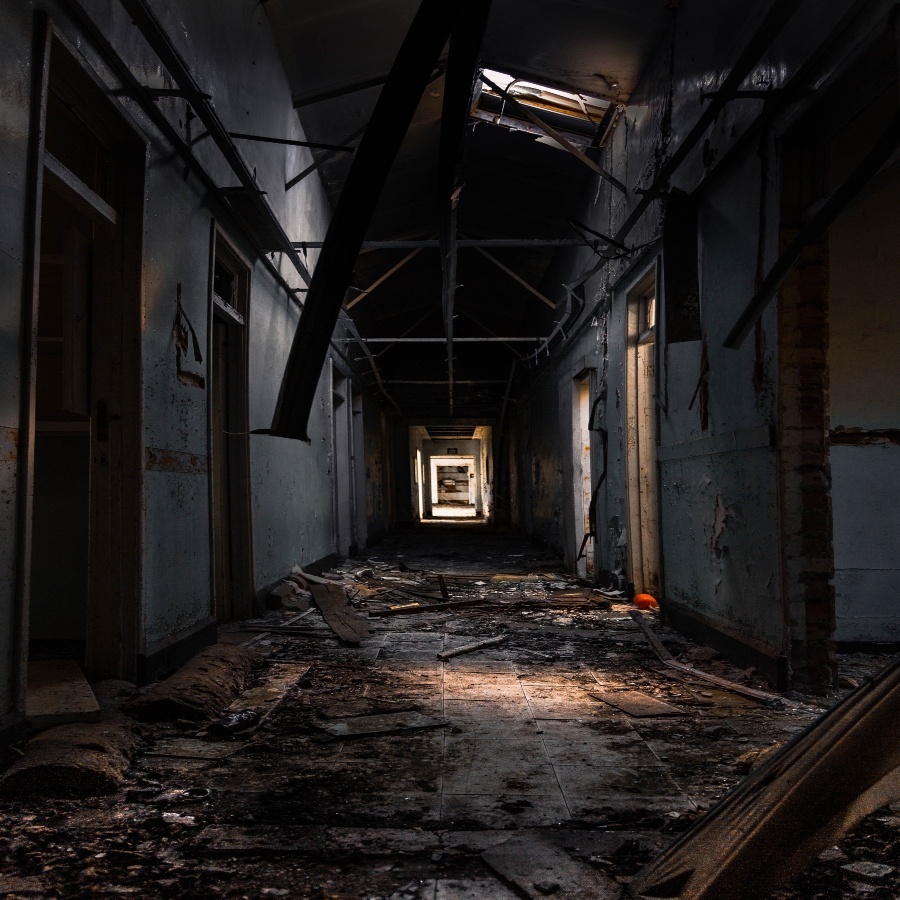In the time that my mother has been missing, the skies have turned a gray, roiling mass. The radio is calling it the most violent typhoon to make landfall in thirty-two years.
We’ve looked everywhere, and there’s nowhere else left except here, in the ruins of the abandoned Wah Fung housing estate, where my mother and I once lived in a tiny room on the sixth floor.
In the clearing outside, a squall tears at my flimsy raincoat and drags an old banyan tree snapping and splintering to the ground. A battered No Trespassing sign flits overhead and ricochets off the crumbling façade. I find an embroidered shoe near the entrance, swirling in the ankle-deep floodwater like a goldfish in the murk.
“Ma! Is that you in there?”
In response, there is only the whistling of the wind.
What on earth could she be doing here—and why now?
I try to recall the last time we were all together: Maggie, the boys, me, my mother, sitting around our dining table. The food getting cold. The nursing-home pamphlet opened to the page where an elderly couple beams at the camera, surrounded by family.
“If that is what you have decided,” she says. And then, after a pause, she adds: “You always choose what is best for your family.”
She doesn’t smile. She doesn’t pat my hand to reassure me that she understands. She doesn’t touch the fish cheek I place in her bowl. But her words slide between my ribs so that even after Maggie, and I clear the dishes and the boys are fast asleep, even after my mother quietly shuts the door to her room and turns off the light, all I can hear is: “You always choose what is best for you.”
* * *
I stumble through the flooded corridors, flashlight in hand, until I see the old provisions store, tucked beneath the stairwell, where my mother used to work.
The shutters on one side have collapsed, revealing a row of empty shelves. I think of my mother stacking tins of oily fried dace, her thick, black hair in a knot, the radio behind the counter crackling a Teresa Teng love song. She pauses in front of the radio before changing the channel and then tells me to finish my homework before she locks up.
I find the other shoe on a landing about halfway up, waterlogged and torn at the sole. The whistling continues unabated.
* * *
I step into my childhood home at the end of a long corridor on the sixth floor. The room is empty, save for the candle on the floor, painting the peeling walls a flickering orange, and the figure by the window struggling with the handle.
“Ma—are you hurt?” I say. “What are you doing?”
She is surprised to see me, but then her expression hardens. “It’s rusted shut,” she says. “Can’t get it open.”
“Come on, Ma.” I put an arm around her shoulder, but she pulls away.
“Just let me do this,” she says.
“Come on—we shouldn’t even be here.”
I take her by the wrist, but even now, I’m surprised by her strength. She wrenches free and bangs a bony fist onto the rusty handle. A cry of frustration escapes her lips.
“Ma—have you lost your mind?” I shine the flashlight on her hand, where an ugly purple blotch is already pooling beneath the skin. “We can talk at home.”
“I didn’t ask you to come.”
This is what happens when we talk: words fly out of our mouths, but we never seem to understand each other. “What do you want, then, Ma?”
“Just—help me,” she says. “Please.”
Outside, the rain surges like waves on rock. The whistling is louder, too, coming from all directions, rising and falling, as if seeking harmony but never quite finding it. I realize she’ll never leave this place until she does whatever she’s here to do.
“Fine,” I say.
I raise the heavy flashlight and bring it down sharply on the handle. Once, twice. A crack, and then something gives way. The window explodes, ejected by a mighty pressure. The candle goes out. And I remember.
The day of the big typhoon, thirty-two years ago.
Ma says the store will be flooded, so I wait for her under the dinner table, wrapped in a thick blanket. The wind whistling all around. Suddenly, the window bursts open, and I’m engulfed by a sound that I can feel in the pit of my stomach, a deep thunderous drone: beautiful, like the long, solitary call of a blue whale, but also infinitely terrifying, like the howl of some unfathomable beast, so loud that even the floor shakes.
I curl up into a ball under the blanket and call for her, not realizing that she is already beside me.
“I’m here,” she says, pulling me deep into her arms. “It’s all right. I’m here.”
* * *
My mother listens now, silvery-white hair plastered to her face, enraptured by the haunting harmony of the typhoon barreling as it did a lifetime ago, along winding corridors, between cracks in the walls, and through the room on the sixth floor with the open window.
She finds my hand and clutches it, now and in the past. We listen for a while.
“I’m here, too,” I say.
“I know.”
*Originally published in And If That Mocking Bird don’t Sing: Parenting Stories Gone Speculative

